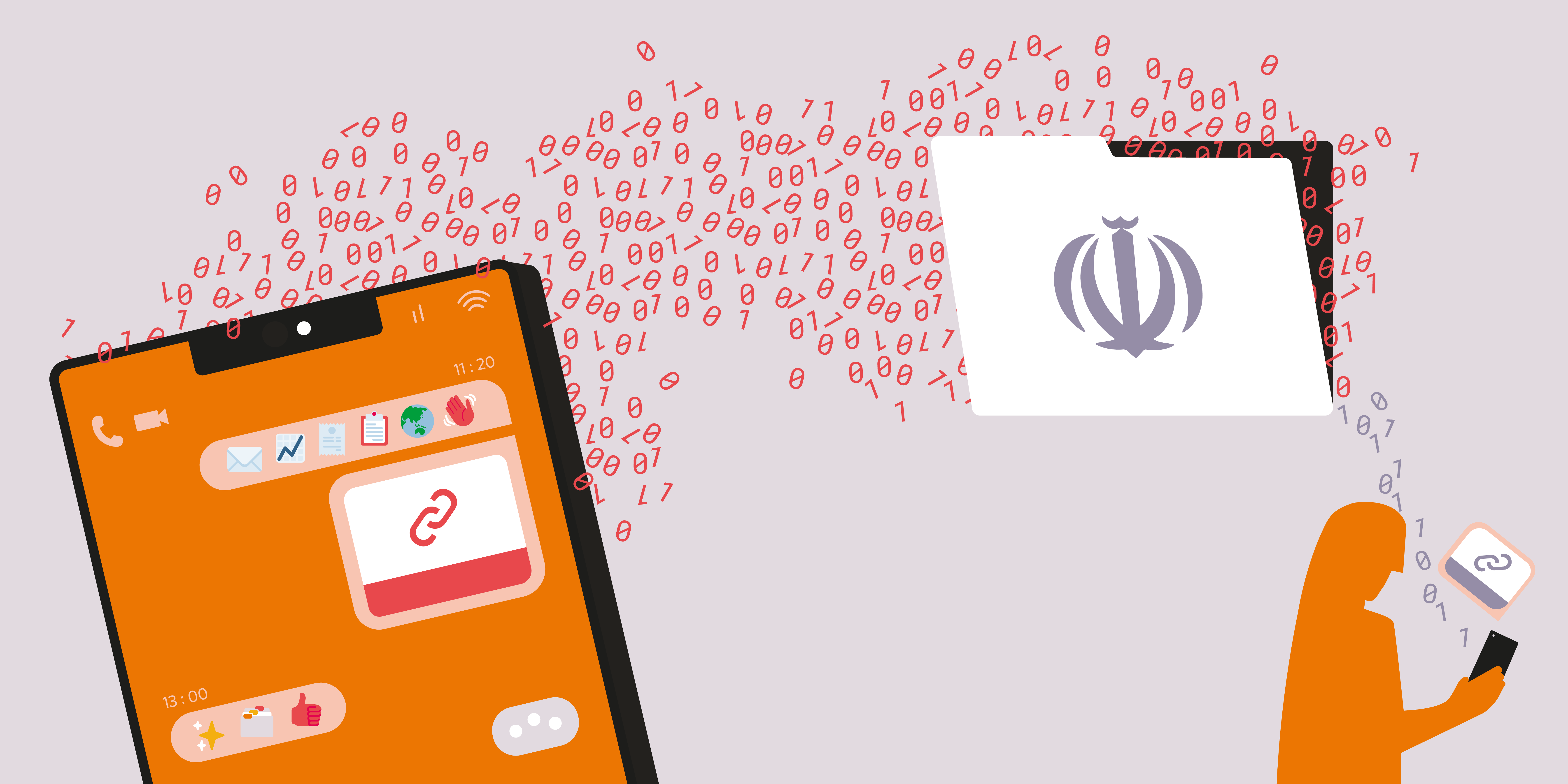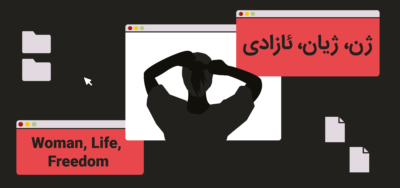The role of Telegram in the late 2017-early 2018 protests resulted in the app being blocked by the Judiciary on 30 April 2018 and intensified government attention on the role of messaging apps in the online ecosystem, triggering a heightened security response to the use of international messaging apps in Iran. With such increased sensitivities and the arrival of the ‘Managing Social Messaging Apps’ Bill, the road was paved for the infamous internet restriction legislation now widely referred to as the “User Protection” Bill.
The plan called for government support for the production and promotion of domestic messaging apps as well as looking to enforce the use of servers inside the country by international apps which would also require them to share data with government bodies if requested. The initial draft of the ‘Managing Social Messaging Apps’ Bill – along with five other internet-related bills – went to the Majles, although none of them passed into law, they paved the way for the insidious progress of the National Information Network (NIN), internet shutdowns, and further information controls for those inside Iran.
***
Messaging apps such as ‘Bale,’ ‘iGap,’’Rubika,’ and ‘Soroush’ are just a few examples of the Iranian messaging apps that have entered the market during the past few years, a number of which have received considerable investment and support from the government.
Though the Iranian government has had considerable success in establishing the NIN, imposing internet shutdowns, and implementing online censorship practices, usage of Iranian messaging apps is negligible compared to that of international counterparts. Even the blocking of foreign apps, government support, and widespread advertising for domestic platforms has failed to make any real change in this trend.
Figures from the National Center for Cyberspace (NCC) between 23 October – 21 November 2021 claim that a total of 20 million people have been using domestic messaging apps, representing some 36% of all users while figures from Iran’s Statistical Center from a mid-2021 report shows that 88% social media users using Meta’s ‘WhatsApp’ as their preferred messaging app.
This report highlights the various nefarious and coercive ways the government is forcing users to download and use domestic platforms. In this report, we look at the current state of Iran’s domestic messaging apps and the cause-and-effect relationship between Iranian users’ lack of trust in domestic messaging apps and the inorganic methods used to expand their user base.
Lack of Popular Support for Domestic Social Media Networks in Iran
Despite widespread promotion using state media, including the Islamic Republic of Iran Broadcasting (IRIB), Iranian messaging apps have not been able to attract a considerable user-base.
What Do the Figures Say?
Download figures for the nine main domestic messaging apps in Iran indicate that they have failed in gaining widespread adoption. For example, download figures from the Iranian app store Café Bazaar from early 2022 show that the messaging app ‘Eita’ had been downloaded nine million times, ranking first, followed by ‘Soroush Plus’ with seven million downloads, ‘iGap’ with five million downloads, ‘Bale’ with four million downloads, and ‘Gap’ with just two million downloads.
According to the Google Play Store, ‘Soroush Plus’ and ‘Bale’ only had one million downloads each; ‘Eita’ was not available on the Play Store, while ‘iGap’ was the most successful Iranian messaging app on the app store at five million downloads. It is of course possible that the apps have been downloaded through other means, e.g. through their websites and Telegram channels which would not be reflected in these figures.
Despite extensive government efforts to increase user uptake for the use of domestic messaging apps, Telegram and WhatsApp continue to remain the most popular among Iranian users. According to a poll conducted by Iran’s Students Polling Agency between 23 July – 22 August 2021, 71.4% of those polled used WhatsApp, with Instagram in second place at 53.1% and Telegram in third place with 40.4%. Domestic apps such as ‘Rubika’ with 8.6%, ‘Soroush’ with 5.1% and ‘Bale’ 4.4% comparatively had much lower figures.
It should be noted that the blocking of Telegram in 2018 has no doubt influenced this trend. However, what these figures reveal is the fact that the blocking of a major international messaging app such as Telegram has a limited effect on users taking up domestic versions as they have shown that they still prefer international apps.
The Insignificant Bandwidth Share of Domestic Platforms
In December/January 2018 Telegram and Instagram were restricted for a limited time due to ‘security reasons.’ A month later, the ICT Minister at the time, Mohammad-Javad Azari Jahromi announced that the country’s total internet bandwidth use had dropped by 45% following the restrictions on the two apps.
Amir Mohammadzadeh Lajevardi, a Board Director at the Telecommunications Infrastructure Company (TIC) stated last year that the domestic internet only made up 20% of the country’s bandwidth use, while the rest remaining bandwidth was taken up by international use the majority of which “went towards Meta owned platforms, meaning WhatsApp and Instagram” according to Lajevardi. This means that the main share of foreign traffic has moved from Telegram to Meta products such as Instagram and WhatsApp.
The current policy on internet bandwidth use as set by the ‘Macro-Plan and the Architecture of the National Information Network’ resolution from the SCC, the goal is for 70% of the bandwidth to be used for domestic traffic and only 30% for international traffic.
Getting Users Onto Iranian Platforms: Tricks for Clicks
Figures mentioned above show that fears of the “User Protection” Bill and the internet shutdowns have not been enough on their own to bring users onto domestic platforms. The current ICT Minister, Eisa Zarehpour also commented on this issue earlier this year saying that “the next layer of the NIN will be basic application services which – after messaging apps – includes search engines, maps, and navigation systems, where we must minimize our reliance on them as much as possible.”
There are several different reasons why users have not warmed to these domestic apps: government support on the one hand, and poor-quality or limited service on the other, along with users’ mistrust of the apps in terms of security, transparency, and effectiveness, have done nothing to spur users’ interest.
Below, we explain how the government has been providing support for these apps and the security concerns surrounding their use.
Government Loans
Despite their lack of popularity, domestic messaging apps have had access to state support with many of these apps having some government link or dependency.
Government partnerships behind the development of these apps is perhaps one of the fundamental reasons why many people do not trust them. In many cases, these partnerships have translated to financial support, promotional activities, providing special services and at times coercive methods for gaining users.
In 2020, Ali Khazarian, the Spokesperson for the Parliamentary Article 90 Committee said that the ‘Managing Social Messaging Apps’ Bill would call for the government to dedicate 10% of income from international bandwidth sales to support domestic messaging apps and content creators. Citing a speech by the Supreme Leader where he had claimed the internet had been “abandoned” Khazarian said that the Bill was a way to prevent an “unrestricted” internet.
In April/May 2018 during Hassan Rouhani’s presidency a 50 billion IRR loan was issued to support the expansion of “successful apps,” which the developers failed to pay back. In late 2021 Zarepour agreed to a six-month extension for repayment of their loans.
The Allure of Added Services to Win App Users
Special added and provisions being included in domestic apps has been a tactic to force users onto these platforms.
One example was the bank transfer services provided by the ‘Bale’ app, which is produced by the Sadad Informatic Corporation (Persian: دادهورزی سداد) and financed by the National Bank of Iran. The app’s relationship with the bank no doubt gave it exclusive access to bank transfer services which was not available via other messaging apps at the time.
Other services include the currency exchange services for pilgrims attending Arba’een ceremonies in Iraq which was exclusively provided by the ‘Bale’ app and allegedly resulted in more than 40,000 new users in just half a day. Iran’s National Bank announced that they would not issue text messages for transactions under 300,000 IRR and users could manage their accounts through ‘Bale’ and some other domestic apps, forcing users onto these apps as a way to avoid extra financial charges.
‘Rubika’ is another domestic app and the product of Toska Company. According to official records, its major shareholders are: ‘Mobile Telecommunications Company’, ‘Nagsh-e-Aval-e-Keyfiat’ (NAK), (Persian: نقش اول کیفیت), and Noor Dana Development Capital, which are all subsidiaries of the TCI.
Toska had also won a controversial tender to promote value-added services on the Islamic Republic of Iran Broadcasting (IRIB), and the company profited from this work by advertising Rubika during the most-watched television programs. This also forced millions of users to download the app in order to participate in state television polls through IRIB. In light of the promotional monopoly, various reports have been published about Toska’s efforts to erect obstacles for the owners of online businesses, as well as other messaging apps. In an interview in 2020, Hossein Kiani, Director of Public Relations for the messaging app ‘Gap’ said “Rubika thinks of itself as a conglomerate with no competitor, and as a subsidiary of Toska, it blocks television ads for other messaging apps. Even if there’s no written ban, in practice a series of bizarre administrative roadblocks prevent any kind of TV advertising for a messaging app like Gap.”
This is of course not an exhaustive list of measures used to force users onto these apps. According to a report from the Iranian news outlet Tejarat News on 19 August 2021, Rubika resorted to widespread copying of user profiles from Instagram onto Rubika without users’ consent, a blatant breach of user data and privacy which resulted in the app’s removal from the Google Play Store. State support based on the decisions of the Supreme Council for Cyberspace (SCC) continues for other messaging apps, large and small. The government has even forced online business owners to download domestic messaging apps in order to receive the “e-Nemad” or “Electronic Trust Mark” mandatory for online businesses in Iran, though It is not clear when this policy began, or with what institution.
The Ministry of Education also asked families and teachers to use a domestic messaging app during COVID-19 pandemic for remote learning in early 2020, before the official e-learning app, ‘Shad’ was used around April/May 20, 2020. Students at Azad University were also asked to install the web-application of ‘iGap’ to gain access to their online portal from early 2021.
In one of the latest examples, Iranian customs in 2022 required those who intend to receive a registration code for an imported mobile phone to install the domestic messaging app “We.” This lesser-known app operates under the supervision of the ‘Samih Intelligent Application Systems Company’ which is tied to the University of Tehran. This research center is directed by Habibollah Arasteh, who in 2018- 2019 served as the top official in charge of strategic intelligent systems and the Chief Director for the launch of the General Customs System, at the order of the Economy Minister. It appears Arasteh’s presence in the domestic messaging app ecosystem is fundamentally connected with this affiliation.
Cheaper Internet Traffic Dedicated for Domestic Services
A major and controversial measure to support domestic services is the policy to charge domestic internet traffic at around half the price of international traffic, which violates net-neutrality principles
On 22 July 2018 ‘iGap’ announced that Iran’s three major mobile network operators would charge users a third of the price of international traffic based on the decision from the Communications Regulatory Authority (CRA) to support domestic apps. In light of the CRA’s other decisions regarding domestic and foreign data tariffs, operators must pay the normal tariff for international traffic, half this rate for domestic traffic, and one-third of this rate for domestic messaging apps.
In late 2021, the NCC announced highly contested user numbers figures and traffic rates for domestic messaging apps. According to figures provided by Amir Khorakian, Deputy for Legal and Parliamentary Affairs at the National Center for Cyberspace the Soroush Plus app ranked first among domestic apps with an alleged 12.2 million registered users, however the app is said to only have 2.2 million active users each month.
Soroush Plus’ own website claims to have more than 22 million users, which is at odds with the NCC figures. According to Khorakian, estimates from their sources indicate around 20 million unique user accounts on domestic messaging apps, a fourth of which are said to be active users.
Digiato, which reports on Iran’s internet, highlighted contradictions in the figures from the NCC. According to Digiato’s report the monthly internet traffic for Soroush averaged 10 MB, a figure that reached 1.2 GB on the NIN. If we divide this traffic usage between Soroush’s alleged monthly users, we get a figure of less than one KB per user which translates to an average Soroush user sending about 50 words a month- an unlikely scenario.
Another ambiguous part of this chart provided by Khorakian is the traffic usage rate by Information Exchange Points (IXPs) listed as zero for ‘Gap’ and ‘iGap.’ This means that users of these two apps either don’t use domestic networks at all or use VPNs while using the apps. Given that according to this chart, the monthly traffic figure recorded for “iGap” does not exceed a few Gigabytes, the second theory can be ruled out.
Despite the fact that internet traffic used by domestic messaging apps was supposed to be assessed on the basis of domestic internet use, an IRNA report from 2020 which quoted a CRA Deputy at the time indicated that the use and support for domestic messaging apps had not moved forward per government promises. For example, some used domestic messaging apps for video calls in order to pay half-price for their internet use but many users reported that their data package had run out afterward.
Security and Transparency Concerns
Distrust of domestic messaging apps is widespread not just among ordinary users, but also among government officials themselves. In a 2018 video Rasoul Kazemi, the former ‘iGap’ Director said that the greatest support officials could give would be to “use domestic messaging apps themselves.” Kazemi commented on their unwillingness to embrace domestic products: “I think [people’s] greatest concern about using domestic messaging apps is the leaks and misuse of their private information.”
In a 2020 interview Mohsen Ghaffouri, the Director of ‘Eita’ – whose parent company ‘Andishehyavaran-e Tamaddon-e Emrooz’ (Persian: ندیشهیاوران تمدن امروز) is based at the Development Center of Qom University stated that “even government employees don’t use domestic messaging apps or social media networks, to protect government data.”
In our 2020 report titled “Digital Rights and the Responsibilities of Tech Companies in Iran” we evaluated the role of Iranian tech companies – including the role of messaging apps – in support of digital rights in Iran using the Ranking Digital Rights methodology developed based on UN Guiding Principles for Business and Human Rights. Our report found that all of the Iranian messaging apps received low scores in terms of their policies, which to an extent is derived from the fact none of these companies participated in multi-stakeholder planning and collaboration and collective governance between companies, civil society organizations, academic institutions, investors, governments, and other stakeholders.
As mentioned, one of the biggest concerns about using domestic messaging apps is the possibility of the misuse of user data by security and government institutions or even for commercial purposes and these fears are not unfounded.
On 14 March 2022 the ICT Minister Eisa Zarepour confirmed that security forces could be given access to user data on domestic messaging apps with a warrant from the Judiciary “in special cases” however he did not elaborate on what he meant by “special cases.”
Previously, in 2019 Mohsen Ghafouri the CEO of ‘Eita’ said that the idea that domestic apps were unsafe was a “fabrication by Iran’s enemies” and added that the “easier pursuit of legal and criminal cases on domestic apps” meant more security for users.
Golden Telegram and Hotgram: The Rise and Fall of Telegram
Apart from messaging apps developed inside Iran, we’ve seen instances where domestic groups have simply used existing messaging apps to gather user information. Golden Telegram and Hotgram are unofficial clones or client apps of Telegram which were launched by developers inside Iran. These apps used Telegram’s API to display user account information, messages, and channels, and used a built-in VPN. According to Hassan Beigi the then member of the Parliamentary National Security and Foreign Policy Committee, citing the ICT Minister at the time: “these apps belong to the Islamic Republic of Iran,” and were “legal,” which according to Beigi at the time of the interview “had 25 million members.”
It remains a mystery as to how these apps use the information they gather, without transparency regarding user data collection and storage and the parties which can access it, it is virtually impossible to hold any party accountable until damage is done. It appears nonetheless that the SCC is seeking to create legal mechanisms for accessing user information on domestic messaging apps and domestic services in general.
A short while ago, the Secretary to the SCC Abolhassan Firouzabadi announced that in light of the developments in Iran’s digital economy actions were needed for the private sector to provide services to the government and where necessary users’ financial and welfare information should be kept for purposes of various governmental decisions and economic modeling. Such actions would seem to violate Iranian users’ privacy.
Conclusion
While there has been no warm reception for domestic messaging apps, they remain available with significant government support and domestic developers continue to spend large sums of money through loans available to them to produce updates and add new features. Government policy in this area attempts to encourage more people to use these services, and in several cases, requires people to use them to access public services.
Privacy concerns with domestic messaging apps, as well as a lack of clear data protection laws are among the leading reasons why people hesitate to use them. Nonetheless, the government’s move to raise the cost of international internet services and violation of net neutrality principles will inevitably force more users to adopt these apps.




